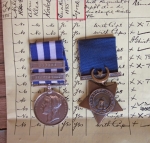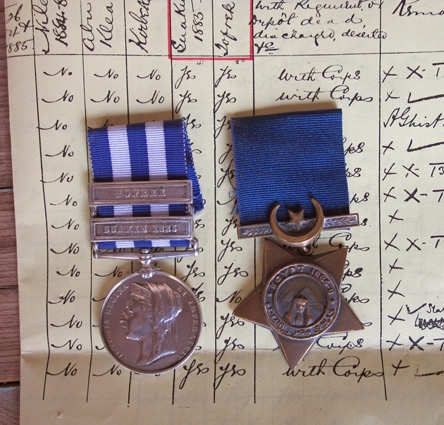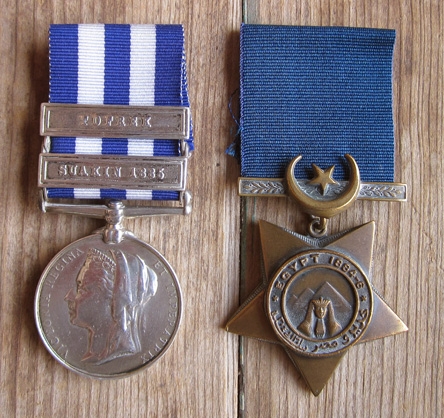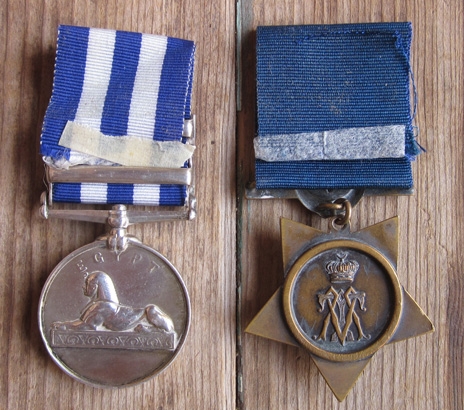British 1880's Egypt Campaign Medal & Khedive Star, Suakin 1885, Tofrek, 12th Co. C&T
This item is listed for historical interest only. It was listed on our site previously but has
been sold and is no longer available for purchase.
Sold for: $550.00
British 1880's Egypt Campaign Medal & Khedive Star, Suakin 1885, Tofrek, 12th Co. C&T
This item is listed for historical interest only. It was listed on our site previously but has
been sold and is no longer available for purchase.
Sold for: $550.00
 Original period manufacture. An original pair of Egyptian Campaign Medal & Khedive Star, awarded to Private G. King, 12th Company, Commissariat & Transport Corps, with clasps for Suakin 1885 and Tofrek.The Egypt medal has an undated reverse, and is properly engraved on the edge, 4571. Pte. G. King. 12th Co. C.T.C., with typical wear to the naming from contact with the Khedive Star. The Star is the proper one for the undated Egypt medal, being dated 1884-6, and crudely engraved on the reverse, G.K.Z.L.. The ribbons on both medals are replacements. Now generally speaking, and with no slight intended to the memory of the C&T soldierly, Commissary medals are rather less interesting, as those assigned were not intended to be front-line troops, rather doing the important job of supplying those combat troops in the field.However, the 12th Company, Commissariat & Transport, were at literal ground zero during the surprise Mahdist attack on General McNeil's zariba near Tofrek, Sudan on 22 March 1885. An attack which came within a hairsbreadth of over-running the British formation, with possible disastrous consequences for McNeil's command. That, coupled with the herculean efforts put forth by the 12th C&T the previous night, in preparing for movement the next day of over 1500 transport animals for the march forward, the men themselves were exhausted and dead on their feet.After an incredibly difficult movement through dense mimosa bush forests (ordered by General Graham, the commander of forces Suakin), an advance of five miles was made before General McNeil called a halt to the madness of the march, and wisely ordered his men to build defensive positions (Zariba).All was going well, the unloading of the transport mules and camels was progressing properly; the animals were in the process of being assembled for the return journey to Suakin, when the Mahdist warriors emerged without warning from the dense underbrush. The attack ran smack-dab into the herd of animals and the 12th C&T. A swirling dust-filled herd of frantic animals charged forward into the British defensive positions, all the while being hacked and stabbed by the Sudanese warriors running amongst them. The British Infantry stood to, and allowed the stampede of terrified men and beasts to pass through them, picking off the Sudanese warriors as they could. Then, orderly volleys of aimed rifle fire smote the enemy ranks before them as wheat before a scythe. The battle lasted a mere 20 minutes with over 1,000 Mahdists laid low, the British casualties amounted to 206, with over 700 transport animals slain.The Tofrek Clasp was awarded to 70 members of the 12th C&T, 8 of whom were listed as dead on the medal rolls. Our Private King survived, and went home to England. I have great respect for the men of the 12th C&T at Tofrek on 11 March 1885, it was an amazing situation. The logistic efforts by the men of 12th Company to get the transport animals moving was an incredible ordeal, one which continued every day until mid April when McNeil's Zariba was abandoned. Amazingly they even had to daily transport fresh water for man and beast out to the zariba; carried in large metal panniers containing distilled seawater, strapped to backs of weary camels.
Original period manufacture. An original pair of Egyptian Campaign Medal & Khedive Star, awarded to Private G. King, 12th Company, Commissariat & Transport Corps, with clasps for Suakin 1885 and Tofrek.The Egypt medal has an undated reverse, and is properly engraved on the edge, 4571. Pte. G. King. 12th Co. C.T.C., with typical wear to the naming from contact with the Khedive Star. The Star is the proper one for the undated Egypt medal, being dated 1884-6, and crudely engraved on the reverse, G.K.Z.L.. The ribbons on both medals are replacements. Now generally speaking, and with no slight intended to the memory of the C&T soldierly, Commissary medals are rather less interesting, as those assigned were not intended to be front-line troops, rather doing the important job of supplying those combat troops in the field.However, the 12th Company, Commissariat & Transport, were at literal ground zero during the surprise Mahdist attack on General McNeil's zariba near Tofrek, Sudan on 22 March 1885. An attack which came within a hairsbreadth of over-running the British formation, with possible disastrous consequences for McNeil's command. That, coupled with the herculean efforts put forth by the 12th C&T the previous night, in preparing for movement the next day of over 1500 transport animals for the march forward, the men themselves were exhausted and dead on their feet.After an incredibly difficult movement through dense mimosa bush forests (ordered by General Graham, the commander of forces Suakin), an advance of five miles was made before General McNeil called a halt to the madness of the march, and wisely ordered his men to build defensive positions (Zariba).All was going well, the unloading of the transport mules and camels was progressing properly; the animals were in the process of being assembled for the return journey to Suakin, when the Mahdist warriors emerged without warning from the dense underbrush. The attack ran smack-dab into the herd of animals and the 12th C&T. A swirling dust-filled herd of frantic animals charged forward into the British defensive positions, all the while being hacked and stabbed by the Sudanese warriors running amongst them. The British Infantry stood to, and allowed the stampede of terrified men and beasts to pass through them, picking off the Sudanese warriors as they could. Then, orderly volleys of aimed rifle fire smote the enemy ranks before them as wheat before a scythe. The battle lasted a mere 20 minutes with over 1,000 Mahdists laid low, the British casualties amounted to 206, with over 700 transport animals slain.The Tofrek Clasp was awarded to 70 members of the 12th C&T, 8 of whom were listed as dead on the medal rolls. Our Private King survived, and went home to England. I have great respect for the men of the 12th C&T at Tofrek on 11 March 1885, it was an amazing situation. The logistic efforts by the men of 12th Company to get the transport animals moving was an incredible ordeal, one which continued every day until mid April when McNeil's Zariba was abandoned. Amazingly they even had to daily transport fresh water for man and beast out to the zariba; carried in large metal panniers containing distilled seawater, strapped to backs of weary camels.
Photos of British 1880's Egypt Campaign Medal & Khedive Star, Suakin 1885, Tofrek, 12th Co. C&T



